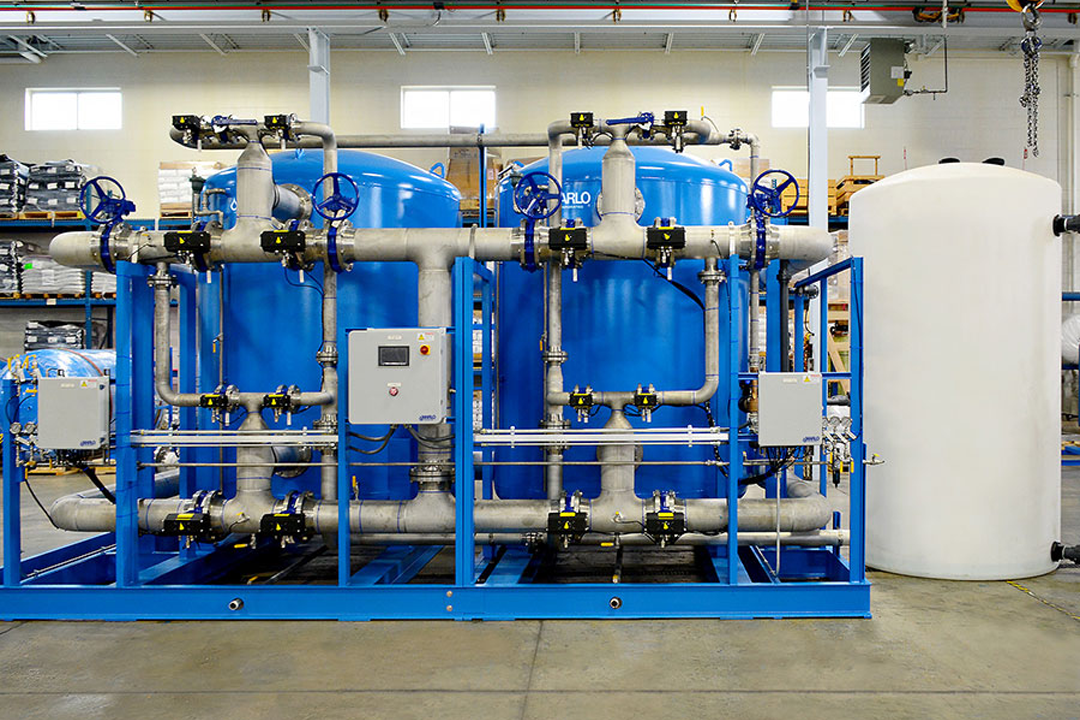Water Softening Plant

A Water Softening Plant is a facility designed to remove hardness-causing minerals such as calcium (Ca²⁺) and magnesium (Mg²⁺) from water. Hard water, which contains high concentrations of these minerals, can lead to scaling in pipes and appliances, reduced soap effectiveness, and increased energy costs. Softening water not only improves its usability for industrial, commercial, and household purposes but also prevents damage to equipment and extends their lifespan.
Key Processes in Water Softening
Ion Exchange Process:
This is the most common method used in water softening plants. In this process, hard water is passed through a resin bed, where sodium ions (Na⁺) from the resin exchange with the calcium and magnesium ions in the water. This results in softened water that contains sodium ions instead of hardness-causing ions.Reverse Osmosis (RO):
Reverse osmosis is sometimes used in conjunction with ion exchange systems. It forces water through a semi-permeable membrane that removes not just hardness, but also other impurities like salts, bacteria, and other contaminants.Lime-Soda Softening:
In this method, lime (calcium hydroxide) and soda (sodium carbonate) are added to the water, which causes the calcium and magnesium ions to precipitate out as insoluble salts. The softened water is then filtered to remove the precipitate.Chelation:
In some cases, chelating agents are used to bind the calcium and magnesium ions, rendering them unable to cause scaling or hardness in water systems.
Applications of Softened Water
Household Use: Softened water improves the effectiveness of detergents and soaps, reduces scale build-up in household appliances like water heaters, dishwashers, and washing machines, and prevents clogging of pipes.
Industrial Use: Industries that rely on boilers, cooling towers, and process water require softened water to prevent scaling that could damage equipment and hinder operational efficiency.
Agriculture: Softened water is also beneficial in irrigation systems, as it reduces the risk of mineral build-up in pipes and soil.
Benefits of Water Softening
Prevents Scale Build-up: Hard water leads to mineral deposits on plumbing fixtures, boilers, and water heaters, reducing their efficiency and lifespan.
Improved Cleaning: Softened water allows soaps and detergents to work more efficiently, leading to cleaner laundry, dishes, and surfaces.
Prolongs Equipment Life: In industrial settings, softened water helps extend the life of machines and equipment by preventing scaling and corrosion.
Enhanced Water Quality: Softened water can improve the overall taste and quality of water, especially in areas with very hard water.
Challenges and Considerations
Salt Usage: The ion-exchange process typically involves the use of salt (sodium chloride), which must be replenished regularly. This can have environmental and logistical implications.
Waste Disposal: The by-products of water softening, such as brine, need to be properly disposed of to avoid environmental contamination.
Cost: Installing and maintaining a water softening plant can be costly, especially for large-scale operations. However, the long-term savings in energy and equipment maintenance often justify the investment.
In conclusion, a water softening plant is essential for improving water quality and extending the life of water-related systems and appliances. Whether for household use or industrial purposes, these plants provide significant benefits by addressing the issues associated with hard water.
Lenntec – Water Treatment Solutions for a Cleaner, Safer Future!
© 2024 Created with Lenntec Team.
Service
Reverse Osmosis (RO) Plant
Water Softening Plant
Ultra Filtration Plant
Wastewater Treatment Plant
Zero Liquid Discharge Plant
Support
About Us
Privacy Policy
Terms and Conditions
Contact
FAQ
Contacts
(352) 683-0000
34606 Spring Hill, Florida, United States

